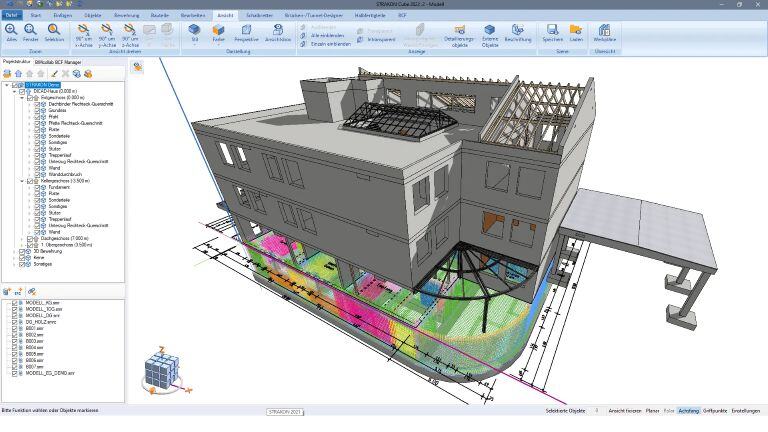
If you are a civil engineering student or professional, the best way to future-proof your career is to embrace Building Information Modeling (BIM). And, it’s not another passing-by statement, there is data to back this up:
- A survey by the Associated General Contractors of America (AGC) 2026 states, “BIM skills are the most in-demand in construction.”
- A study by the US Bureau of Labour Statistics claims an estimated growth of 13.3% by 2033 for BIM coordination roles.
So, if you want to be at the forefront of this industry-wide revolution, securing a BIM certification would be a wise step forward.
What is BIM & Why It’s Important for Civil Engineers?

Building Information Modeling (BIM) is a tech-driven process that involves the creation of a 3D model that contains the physical, structural, and operational attributes of a building. In the field of civil engineering, BIM streamlines construction planning and management. This elevates a project’s efficiency by integrating real-time data and analysis which allows better collaboration and decision-making. Conclusively, BIM is a technology that is fast gaining popularity in the civil engineering industry.
The Growing Demand for BIM Professionals in the US

The demand for BIM professionals in the US is rising rapidly as the construction industry shifts toward more efficient, technology-driven workflows. Construction firms are increasingly seeking skilled BIM specialists who can create and manage digital models, coordinate multidisciplinary teams, and optimize project outcomes. As more firms adopt BIM as a standard practice, career opportunities in this field continue to expand, making it a promising path for those with the right expertise.
Overview and Classification of International BIM Certifications
If you are wondering “what is a BIM certificate”, it is a document that validates their expertise in digital modeling, collaboration, and project management within the construction industry. These certifications are typically categorized into different levels based on proficiency, ranging from foundational knowledge to advanced modeling and integrated workflows.
1. BIM Level 1: Foundational
These focus on the basics of digital modeling and project documentation. It covers essential concepts such as 2D drafting, 3D modeling, and data management within a single discipline.
2. BIM Level 2: Collaboration
BIM Level 2 certifications are awarded to professionals who have an understanding of Common Data Environment (CDE) where multiple stakeholders, including architects, engineers, and contractors, exchange and coordinate data efficiently.
3. BIM Level 3: Advanced Modelling
BIM specialist certification represents the highest level of expertise, focusing on fully integrated and data-rich project environments. It involves cloud-based collaboration, real-time data sharing, and the use of artificial intelligence or automation.
Related Read: How Much Does A BIM Certification Cost in Different Cities in India
5 Key Factors to Consider When Choosing a BIM Certification

With multiple certifications available, selecting the best BIM certification can be overwhelming. So, here is a guide to selecting the right BIM certification for individuals seeking exponential career growth.
1. Industry Recognition
Look for certifications accredited by reputable organizations or recognized academic institutions. These credentials demonstrate compliance with industry standards and enhance your employability.
2. Certification Level
BIM certifications are often structured into different levels such as Level 1, Level 2, and Level 3. You should assess your current skill level and career aspirations before narrowing down to a certification. If you're new to BIM, start with an entry-level course before progressing to advanced levels.
3. BIM Certification Cost and Time Commitment
BIM certificate programs vary in duration and cost, ranging from short online courses to in-depth university programs. Consider your budget and availability before committing. While some employer-sponsored certifications may cover the costs, self-paced online options can be more flexible for working professionals.
4. Geographic Relevance
BIM standards differ across countries and industries. Take for example, the UK follows the PAS 1192 framework, while a BIM certifications in USA aligns with ISO 19650. It is vital to ensure the certification you choose is relevant to your region and aligns with the BIM practices used in your field of work.
5. Job Market Demand
Research how valuable a BIM certification is for the job role you desire. For instance, BIM coordinator certification, BIM technician certificate, BIM modeling certification, BIM Revit certification, and BIM management certification are some of the key industry roles that you can specialize in. Check job postings, industry reports, and professional networks to see which certifications are in demand for the roles you’re targeting.
Top 7 BIM Certifications in the USA
If you are curious to learn how to get BIM certifications at various stages of your career, here is a comparative guide.
|
Certificate |
Issuing Organization |
Focus Area |
Industry Recognition |
|
Novatr’s BIM Professional Certificate |
Novatr and Autodesk |
BIM implementation |
Accepted worldwide |
|
buildingSMART |
BuildingSMART International |
OpenBIM standards, IFC, interoperability |
Highly recognized globally |
|
AGC BIM Certification |
Associated General Contractors (AGC) |
BIM management, project coordination |
Well-regarded in US construction industry |
|
Autodesk BIM Certification |
Autodesk |
Software proficiency (Revit, Navisworks) |
Recognized for software expertise |
|
BIM ISO Certification |
BSI Group |
Compliance with ISO 19650 standards |
Essential for firms working on international projects |
|
RICS BIM Certification |
Royal Institution of Chartered Surveyors (RICS) Academy |
BIM strategy, cost management, procurement |
Recognized in infrastructure, and asset management sectors |
|
Graphisoft BIM Manager Program |
Graphisoft |
BIM applications using Archicad |
Widely accepted for BIM designer roles |
|
Bentley BIM Modeler Accreditation Program |
Bentley |
OpenBuildings Designer software |
Acknowledged in leading BIM firms |
1. Novatr’s BIM Professional Certificate
This BIM Professional certification is awarded to individuals who successfully complete Novatr’s 7 month long BIM Professional Course. The curriculum is crafted and vetted by global experts, incorporating ISO 19650 compliant project simulations and aligning with the Royal Institute of British Architects framework for BIM workflows. Learners benefit from weekly live sessions, dedicated mentor support, and flexible learning options.
2. BuildingSMART
The buildingSMART International Professional Certification provides openBIM training. It is meant for professionals for zero to basic experience in BIM. It provides certification for four levels- entry level, foundation level, management level, and practitioner level. They offer free self-paced online educational resources to help participants prepare for the certification exam. Digital badges are awarded to candidates after clearing each level of openBIM proficiency.
3. AGC BIM Certification
The AGC Certificate of Management in BIM is a recognition awarded to individuals who complete 4 mandatory courses and pass their online exam to receive the designation of CM-BIM. It is an assessment-based credential that testifies a person’s knowledge of BIM workflows. Aspirants can also avail an self-paced course to strengthen their preparation for the exam. The fee for appearing for this exam is $575, as of March 2026.
4. Autodesk BIM Certification
Autodesk BIM Certification offers a comprehensive certification program designed to validate professionals' expertise in BIM using its exclusive suite of software tools. The certifications are structured across various proficiency levels, namely, Certified User (ACU) for foundational skills, Autodesk Certified Associate for intermediate proficiency, and Autodesk Certified Professional (ACP) for advanced expertise. For instance, the ACP in Revit for Architectural Design is a Revit BIM certification that assesses advanced skills in architectural modeling and documentation within Revit. Achieving Autodesk certification involves passing a proctored exam, and the credentials remain valid for two to three years.
5. BIM ISO Certification by BSI Group
The ISO 19650 certification for BIM provides a structured methodology for managing data throughout the lifecycle of built environments. It is divided into several sections, covering fundamental principles, asset delivery, operational management, information exchange, and security protocols. Implementing ISO 19650 promotes better coordination among project stakeholders, minimizes mistakes, and enhances cost efficiency, value, and sustainability.
6. Certificate in BIM by RICS Academy
It is an online program designed to enhance professionals' abilities in implementing and managing BIM processes. Participants will gain insights into creating a business case for BIM, understanding the transition to ISO 19650 standards, and developing key documents like the Exchange Information Requirement (EIR) and BIM Execution Plan (BEP). By completing this program, professionals can demonstrate their commitment to advancing their BIM project management skills and contributing to more efficient project delivery.
7. Graphisoft BIM Manager Program
Graphisoft's BIM Manager certification program is a comprehensive course designed for professionals aiming to excel in managing BIM processes using Archicad. The program spans 10 weeks and encompasses three key modules: BIM Office Management, Archicad Template Creation, and BIM Project Coordination. Participants engage in a blend of pre-recorded self-paced sessions and live meetings with trainers. Upon completion, attendees earn the Graphisoft Certified Archicad BIM Manager credential, demonstrating their proficiency in overseeing BIM operations within an organization.
8. Bentley BIM Modeler Accreditation Program
If you are looking for BIM Manager certification online, this program would be the right fit for you. It is a professional credential that establishes a candidate’s proficiency in using OpenBuildings Designer software. Aimed at enhancing participants' skills and career prospects, the program combines live, discipline-specific QuickStart sessions with an accreditation course, culminating in a hands-on design project. Graduates receive an official Bentley certificate and digital badges.
Which BIM Certification is Best for You?

Choosing the right BIM certification depends on your career goals, industry focus, and skill level. Here’s a breakdown to help you decide.
1. For BIM Beginners and Students
If you are new to BIM, opt for certifications that introduce you to industry-standard BIM software and help you build credibility when applying for entry-level roles.
2. For BIM Technicians and Modelers
Professionals who create and manage BIM models certifications that validate their proficiency in modeling, documentation, and data coordination
3. For BIM Coordinators and Managers
If your goal is to oversee BIM implementation across projects, focus on certifications for BIM coordination, clash detection, and project workflow optimization.
4. For BIM Consultants and Industry Leaders
Those seeking leadership roles in BIM implementation and strategy should consider globally recognized programs that emphasize BIM governance, digital transformation, and regulatory compliance.
Alternative to Certifications: A Practical BIM Training Program
While certifications provide a formal recognition of knowledge, a practical BIM training program offers an alternative approach by focusing on hands-on learning and real-world applications. This type of BIM certification courses allows professionals to gain direct experience with BIM software and tools, providing them with the skills needed to work effectively in the field. In such BIM professional certification courses, participants often work on real-life project scenarios that allow them to navigate everyday challenges of implementing BIM processes.
In contrast to traditional certifications, practical BIM training may include interactive workshops, case studies, and project-based exercises that encourage learners to collaborate with others and simulate the complexities of a real BIM project. This approach ensures that individuals can immediately apply their learning in their workplace and make tangible progress. With a focus on practical skills, these programs provide an effective solution for professionals looking to hone their BIM capabilities without necessarily pursuing a formal certification.
In Conclusion
While the AEC industry has traditionally been resistant to change, VDC is proving to be a catalyst for innovation, moving the needle towards smarter architectural and engineering solutions. Learning BIM as part of the larger picture of VDC can position you at the forefront of these advancements while also opening up opportunities for career growth and success in an increasingly tech-driven market.
We recommend considering the BIM Professional Course for Civil Engineers offered by Novatr. This course provides practical knowledge of BIM software, workflows, and processes, which are crucial for a successful career in the field. Taught by industry experts, the program shares real world insights, applications, and case studies. The curriculum is enriched with capstone projects, mentorship opportunities, career counseling, and placement support, enhancing the overall learning experience.
Check out the course now!
For more information on the BIM-related jobs, visit our resource page.
Was this content helpful to you







